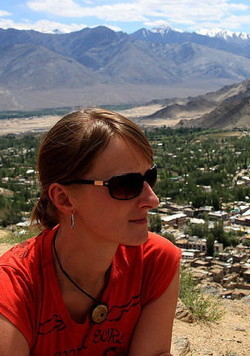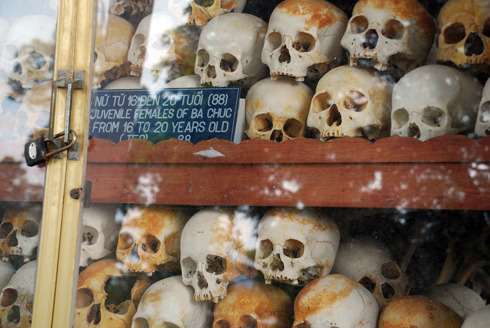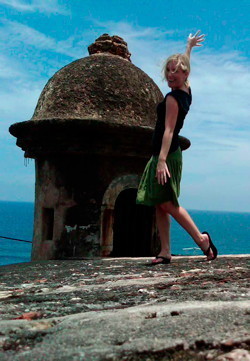Rolf Potts's Blog, page 124
June 29, 2011
Vagabonding Case Study: Magda Biskup
Magda Biskup
http://www.destination-world.net
Age: 33
Hometown: Rybnik, Poland. Now living in Sydney, Australia
Quote: "I never expected every single location to be breathtaking and exciting. This meant that I never really felt disappointed, I just liked some places more than others."
How did you find out about Vagabonding, and how did you find it useful before and during the trip?
When I first came up with the idea of going for an extended world trip I started looking for some inspiration to stay focused on that dream. I found a number of great travel blogs and one of them mentioned Rolf's book. I got it from my local library and instantly fell in love with it. After I finished reading I felt like everything was possible. The book really helped to make my dream come true.
How long were you on the road?
20 months, from December 2008 until August 2010.
Where all did you go?
I started in New Zealand and then went to the Philippines, Thailand, Myanmar, Laos, Cambodia, Vietnam, China and Mongolia. I then took a Trans-Siberian train to Moscow stopping on the way to see Lake Baikal. This leg of my trip took me about 7 months to complete. I spent a few weeks in Europe visiting family and friends and then went to South America for 6 months. It was supposed to be the end of the trip, but I couldn't resist and went to Nepal and India for a few months.
What was your job or source of travel funding for this journey?
The entire trip was funded by the money I had earned before I left. I started saving about 15 months before I went traveling. Once I knew I really wanted to travel it wasn't very hard to find the money. I believe it's all the matter of having your priorities straight. Sure, I had to make some sacrifices and do without lots of things like takeaway lunches, new clothes etc., but I never felt like I was missing on life.
Did you work or volunteer on the road?
The idea for this trip was to take time off and enjoy freedom as much as possible, so I never worked. But I know that if I travel again for an extended period of time (which I'm sure will happen) I will definitely volunteer. This first long trip was very much about sightseeing and discovering beautiful places. Next time I travel I want to do it much slower, stay in different places for longer, learn more about the people and the culture and I believe that volunteering is one of the best ways of doing that.
Of all the places you visited, which was your favorite?
It's really hard question – there were so many beautiful places! Argentina, New Zealand and Thailand are my favourite countries, but there were so many other amazing locations on the way – Salar de Uyuni and Altiplano in Bolivia, Galapagos, Lake Baikal in Russia, Ladakh in India… I could list many more.
Was there a place that was your least favorite, or most disappointing, or most challenging?
Some places were less interesting than others, but I never expected every single location to be breathtaking and exciting. This meant that I never really felt disappointed, I just liked some places more than others.
Did any of your pre-trip worries or concerns come true? Did you run into any problems or obstacles that you hadn't anticipated?
To be honest my main fear was what was going to happen to me after I finish traveling. I always assumed that once I travel it would be just awesome, but the great concern was my future after the trip. I was seriously stressed about it the entire time I was planning the trip and then for the first few weeks on the road. But I very quickly relaxed and realised that the future is very much up to me.
The trip went surprisingly well in terms of avoiding problems. I never got robbed, never got seriously sick; however I happened to be in Santiago de Chile during the massive earthquake in February 2010. Luckily nothing happened to me.
Which travel gear proved most useful? Least useful?
I am a big believer in low tech travel gear and simplicity on the road. Less is better. My top 3 travel gadgets are bandana (which I used – depending on the circumstances – to cover my head, take the sweat from my face or clean my nose. It's easy to wash and very small), compact umbrella (waterproof jacket is the last thing you want to wear when walking in rain in places like Bangkok) and a small water heater which boils a cup of water in about a minute. I used it all the time for making tea and coffee.
I didn't have any branded clothing or other fancy travel gadgets and it worked pretty well for me. I had a tiny laptop with me which I used all the time. The least used gadget was my mobile phone. During the entire trip I used it maybe 10 times to send text messages. I used Skype to communicate with friend and family instead.
What are the rewards of the vagabonding lifestyle?
Definitely freedom. I loved the idea that there was no schedule to follow and that every day was completely up to me. The other great thing about being a vagabond is that you are faced with new situations and learn something new every day.
What are the challenges and sacrifices of the vagabonding lifestyle?
Being away from friends and family is definitely hard, but thanks to the modern technology it's easier to stay in touch these days. The feeling of not belonging anywhere can be sometimes difficult to handle, but I believe that the benefits of being a vagabond outweigh the disadvantages.
What lessons did you learn on the road?
Many. I learned to be patient, which was a huge thing for me. It made me calmer and more relaxed. I learned that my life is in my hands and it's up to me how I live it. I learned that people all over the world – despite different looks, religions, customs and way of life – just want to be happy and loved. I learned that having less things makes like much simpler. And I learned some Spanish
How did your personal definition of "vagabonding" develop over the course of the trip?
At first it was very much about visiting new places and moving from place to place. After a while I realised that there is much more to it. Vagabonding is living in harmony with yourself and challenging yourself constantly by interacting with different cultures.
If there was one thing you could have told yourself before the trip, what would it be?
I wish I knew about people who called themselves digital nomads. I only became aware of their existence when my trip ended. Those people support themselves earning money on the internet when living in the most amazing locations. They basically travel full time. Knowing about them back then would have maybe helped me to earn money to travel for longer than 20 months.
Any advice or tips for someone hoping to embark on a similar adventure?
Just do it. It is seriously worth any effort you might need to put into making it happen. There is this famous quote by Mark Twain that you can find on half of the travel blogs out there, and I think it's so popular because it is so true. This quote is my motto in life:
Twenty years from now you will be more disappointed by the things that you didn't do than by the ones you did do. So throw off the bowlines. Sail away from the safe harbor. Catch the trade winds in your sails. Explore. Dream. Discover.
When and where do you think you'll take your next long-term journey?
I hope that within next 2 to 4 years I'll be able to travel again. This time it would be much slower. I'd like to go to a place, rent a small apartment and live as a local for a few months, do some volunteering, maybe learn a bit of a language. As for destination I couldn't be sure. My heart is thorn between Asia and Latin America.
Twitter: DestinatioWorld
Website: www.destination-world.net
Are you a Vagabonding reader planning, in the middle of, or returning from a journey? Would you like your travel blog or website to be featured on Vagabonding Case Studies? If so, drop us a line at [email protected] and tell us a little about yourself.
June 28, 2011
Traveling beyond the dryness of statistics
Ba Chuc, Vietnam
Ba Chuc, a Vietnamese community in the Mekong Delta, sits just across the border from Cambodia. In April 1978, Khmer Rouge soldiers entered the village from Cambodia and massacred 3,157 men, women, and children—almost the entire population. Today the skulls of the victims are on display in an outdoor memorial.
Statistics, when referring to numbers of dead, fall flat in their attempts to convey the humanity of what has been lost. This is because emotions are connected to people, not numbers. Try, for example, to process this excerpt from Chris Hedges' book War is a Force that Gives Us Meaning (2002):
Look just at the 1990s: 2 million dead in Afghanistan; 1.5 million dead in the Sudan; some 800,000 butchered in ninety days in Rwanda; a half-million dead in Angola; a quarter of a million dead in Bosnia; 200,000 dead in Guatemala; 150,000 dead in Liberia; a quarter of a million dead in Burundi; 75,000 dead in Algeria; and untold tens of thousands lost in the border conflict between Ethiopia and Eritrea,….
Travel helps make real the abstract. In Ba Chuc, I spent a good amount of time before these skulls, imagining the life that had once animated the now hollow bones. I heard the laughter, the conversations, the sneezes, the crying, and then the sudden ending of it all. The victims in this photo were almost all females in their late teens—girls in the process of becoming women—and more than a few of them died only after being horrifically raped (an adjacent room offered the most nauseating pictures of sexual violence I had ever seen). And in standing on this ground and looking into these skulls, I felt neither the sterility of statistics nor a mere twinge of sadness; I felt a palpable, riveting absence.
June 27, 2011
Travel is not dead (despite what old travelers say)
"Old travelers grumpily complain that travel is now dead and that the world is a suburb. They are quite wrong. Lulled by familiar resemblances between all the unimportant things, they meet the brute differences in everything of importance."
–Jonathan Raban, quoted in the introduction to The Best Travel Writing 2010
June 24, 2011
What it's really like to be a travel writer
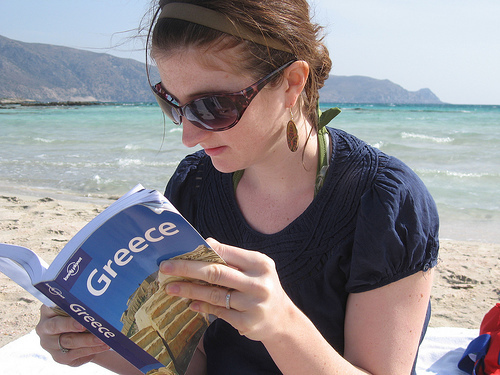
Girl on beach reading Lonely Planet guidebook for Greece. Photo: Jay Bergesen / Flickr Creative Commons
If you like to travel and have your own blog, you may have entertained the idea of being a travel writer. Imagine getting paid to go and do the same fun stuff you're already doing, going all over the world. The reality can be quite different, however. Lonely Planet guidebook writer Leif Pettersen wrote this brutally honest post on his Killing Batteries blog: So you want to be a Lonely Planet author – Redux.
Travel can seem so glamorous that it's hard to imagine what a writer would complain about. Pettersen makes a strong case that in the end, travel-writing work is still work. Ever thought about the gazillion listings for all those hostels, hotels, and restaurants? Often one writer had to visit all those places on their own, in the least amount of time possible.
There is also the creative challenge about writing about the same famous landmarks in an original way. What more can be written about Angkor Wat or Machu Picchu?
What Pettersen finds maddening is that many travelers think they can do that job better than a pro can. Here's a quote:
Nearly every research trip I take involves an encounter with a smug backpacker, sometimes holding a beer at noon, who's under the impression that they're doing exactly what I'm doing, except I'm getting paid.
Guidebook work is done as freelance contract work, which means no benefits and no steady salary. They usually get paid one lump sum, and all their expenses come out of that. If you think that some guidebooks can feel hastily-written and rushed, it's probably because the writer was racing to finish the job and preserve as much of his budget as possible.
For a broader overview, here's a New York Times article that appeared in 2006: A job with travel but no vacation. There was a sobering quote near the end: "Nobody is going to feel sorry for you getting six weeks of free travel in Europe."
Despite the complaints, travel writing is a job with one huge benefit: getting to see the world. Have you ever done paid travel writing? What was your experience like? Please share your thoughts in the comment.
June 23, 2011
Chocolate plus cheese equals yummy
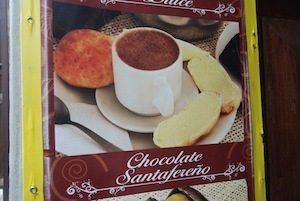 Until I visited Colombia, I thought that my favorite hot chocolate was from Mexico. The dose of cinnamon (and sometimes, chile) has caused me to squirrel away a box of Ibarra or Abuelita for those moments when I crave it.
Until I visited Colombia, I thought that my favorite hot chocolate was from Mexico. The dose of cinnamon (and sometimes, chile) has caused me to squirrel away a box of Ibarra or Abuelita for those moments when I crave it.
But then, in Bogotá, I found something that was even better.
Chocolate Santafereño is, at first, a cup of rich hot chocolate. But then there's the cheese. Cubes of salty queso blanco are added to the steaming chocolate, and as you're drinking, they melt into the perfect consistency to slurp along with the sweet treat. For those who are fans of both sweet and salty, it's hard to go back to plain old hot chocolate.
I know, it may sound weird at first. It did to me. But cheese has a way of getting my attention, so I tried it one rainy morning in Colombia, and I was hooked. Now, I keep a supply of queso blanco in my refrigerator at home to go along with my hot chocolate.
Have you tried it? What's your verdict?
June 22, 2011
Transfering money back home
After living and working abroad for a significant time one will have to face the annoying task of moving not only all of their belongings but also moving all of their finances. It can be a puzzle to figure out the best way to move one's entire savings from one country to the next. Which way is ultimately the best? How can one do this without losing a depressing sum in conversion or banking fees? Is it best to wire the money directly to the home account? Some banks will write a certified check for the entire sum of the account that can be deposited into an overseas account once you make the move.
No one wants to take a gamble with their savings, or lose a large sum in the transfer and later find out there is a better, cheaper way. Knowing that I will eventually have to address this concern myself, I thought I would put it to you readers to share your experiences. How did you go about moving your finances internationally? Share your experience in the comments.
Vagabonding Case Study: Alisha Robertson
http://www.smallworldpursuits.com
Age: 30
Hometown: Nocona, Texas
Quote: "At the beginning of my trip, I was definitely much more of a planner. As my travels progressed, I started going more with the flow and less with plans. I quickly learned that too much planning = stress but not enough planning can also be challenging, I had to find balance."
How did you find out about Vagabonding, and how did you find it useful before and during the trip?
I heard about Vagabonding when I starting doing an excessive amount research and thinking about my second trip – which I left for in April. I started reading tons of travel blogs, writings from Lavinia Spalding, and basically indulging myself in all things travel. At this time is when I found Vagabonding. I used and still use it as a travel resource and for motivation.
How long were you on the road?
My first experience abroad was to Thailand after college. My first long term (more than 6 months) travel journey was for a year in 2008 when I taught ESL in the northern part of Chile. I left again on April 13th for an around the world volunteer trip where I plan to be gone for at least a year, possibly longer.
Where all did you go?
In 2008, I traveled mainly through Peru, Boliva, and Chile. Upcoming is Colombia, Ecuador, East Africa, Morocco, Central/Eastern Europe, India, Nepal, Southeast Asia, Indonesia, and New Zealand.
What was your job or source of travel funding for this journey?
For both trips, I started planning and saving at least one year in advance. In 2008, I worked therefore I made it a point to immerse myself in the culture by also living like a local, and only predominantly spending what I made while working in Chile. For the current trip, I have been saving for quite some time, as I will be focusing on volunteer opportunities so all of the funding has come from saving.
Did you work or volunteer on the road?
Both, I taught ESL as a source of income, and now I will be volunteering. Hopefully, in many places I will be able to volunteer in return for reduced or free room and board saving on accommodations.
Of all the places you visited, which was your favorite?
I'm not sure I can really name a favorite, but I really liked Valparaíso, Chile (Paradise Valley). The town is built on tons and tons of hills and thousands of stairs along the coast. It is so vibrant with creative energy oozing around every corner. From atop of any of the hills you have a view of endless color and the ocean. It also has a very unique characteristic in its outdoor open air museum along the sidewalk in the hills. Think of tons of artistic graffiti. It was created some years ago to support the artistic expression of children in the city. The city actually made me think it could be the San Francisco of South America.
Was there a place that was your least favorite, or most disappointing, or most challenging?
I don't really feel anywhere I have traveled I would consider a disappointment. But, I do remember how intimidating it was arriving in Bangkok. A city so large and a language so different than my own, if I didn't have a group of people with me on the trip, I may have panicked. We will see how it goes when I arrive alone this year.
Did any of your pre-trip worries or concerns come true? Did you run into any problems or obstacles that you hadn't anticipated?
My biggest pre-trip worry of course is always running out of money. That hasn't happened yet. But, I have definitely run across my fair share of obstacles, and I anticipate mishaps along the way as I leave again. When I was living in Chile, I didn't anticipate not being able to converse fluently being so frustrating. I thought it wouldn't be that big of a deal. But, you yearn to have normal conversations and to be able to express yourself like an adult and not like a child. I studied all the time to improve my Spanish! That's one thing about travel though, it makes you so much more flexible and laid back but you also learn to be aware and have your guard up when necessary. So many life skills you walk away with just by taking yourself out of your comfort zone.
Which travel gear proved most useful? Least useful?
I am hoping the new packing cubes I bought for this trip will be super handy. I used travel compression bags for my last trip and they really helped save space!
What are the rewards of the vagabonding lifestyle?
I would say hands down experiences and a broader view of the world. Your own view of the world. I have also met some of the most amazing people, and learned a different way of life and being, just by being open to new experiences.
What are the challenges and sacrifices of the vagabonding lifestyle?
Sometimes not being able to stay in one place long enough to build close friendships, loneliness, not being able to relate as well to other people when you return home, the list could go on. But, overall I think the rewards always outweigh the sacrifices. And for the challenges, it's so amazing when you make it past them!
What lessons did you learn on the road?
Not to carry all of my money in one place, how to say I'm hot (as in the temperature) in Spanish the correct way, that I actually communicate with my family more when I am on the road, to never try and lug a backpack ten times bigger than me around all the time- for this trip, I'm packing much lighter! And, most of all, I learned that I had created what I am sure is going to be a never ending love affair with travel.
How did your personal definition of "vagabonding" develop over the course of the trip?
At the beginning of my trip, I was definitely much more of a planner. As my travels progressed, I started going more with the flow and less with plans. I quickly learned that too much planning = stress but not enough planning can also be challenging, I had to find balance.
If there was one thing you could have told yourself before the trip, what would it be?
Leave half the stuff I packed at home. Oh, and get a credit card with no foreign transaction or ATM fees. Completely forgot about that my first time around.
Any advice or tips for someone hoping to embark on a similar adventure?
Find a group of motivators and supporters to help you along the way so you have a support system for your trip. Also make the initial planning and saving process part of the fun – get a cool roommate, have house parties instead of going out, or maybe shift your social calendar and start reading and learning more about the locations you are going to visit. Don't look at making adjustments as a negative thing, but rather as a new experience to embrace.
When and where do you think you'll take your next long-term journey?
I left again on April 13th, and will be traveling around the world.
Twitter: alishaamr
Website: www.smallworldpursuits.com
Are you a Vagabonding reader planning, in the middle of, or returning from a journey? Would you like your travel blog or website to be featured on Vagabonding Case Studies? If so, drop us a line at [email protected] and tell us a little about yourself.
June 20, 2011
Watching TV in faraway places can be an intimate glimpse into a culture
"There's no point in traveling to another country if all you do when you get there is sit in your hotel room and stare at the television. At the same time, I'm a fierce proponent of sampling a smidgen of TV wherever you go. I assure you the locals are watching the tube, and it's worth it to check out what exactly is getting beamed into their living rooms each night. Treat it as a sociological study, and an intimate glimpse into a culture."
–Seth Stevenson, Grounded: A Down to Earth Journey Around the World (2010)
(2010)
June 18, 2011
Is travel blogging for everyone?
Those of you who are regular readers of Vagablogging know the value of a travel blog when you're looking for information or a community of like-minded people. Just because you enjoy reading travel blogs, however, doesn't necessarily mean you'll enjoy writing one.
There's a checklist of things that long-term travelers generally have in common when they're planning a trip. Each person's list will be slightly different, depending on their situation, but many of the items on the to-do list are common to all RTW travelers – which is why sites like Vagablogging or the BootsnAll RTW forum are so popular. For many, "start a travel blog" has become de rigeur before setting off on a trip – but is travel blogging for everyone?
A recent article on BootsnAll outlined some of the reasons why you might want to start a travel blog before your trip – as well as a few reasons why you might not. What do you think? What's the most important factor to consider when deciding whether or not to keep a travel blog?
This article was yet another in our weekly Round the World Wednesday series – catch up on the articles you've missed and stay tuned for the next one on BootsnAll. And don't forget to sign up for BootsnAll's monthely RTW Travel Newsletter, too.
June 17, 2011
Travel bloggers united at TBEX 2011 in Vancouver

Canadians in Vancouver celebrating 2010 Winter Olympics. Photo: Kenny Louie / Flickr
Travel and writing can both be lonely endeavors, with friends and family not understanding why some of us are obsessed with both. The best fix for the blues is to surround yourself with people who have the same dream, and even better, have achieved success.
For anyone into travel writing, Travel Blog Exchange (TBEX) is the highlight of the year. It brings together travel writers to swap stories, make new friends, and give each other tips on how to make a living from blogging. The Vancouver Observer covered the event: Travel bloggers dream big at TBEX.
A recurring theme spoken both online and offline was, "Can you really make it as a travel blogger?" While there are certainly success stories like The Lost Girls, many bloggers have second–and even third–jobs to pay the rent. The consensus seemed to be, "Do it because you love it. But don't quit your day job anytime soon."
This year's TBEX seemed to emphasize professionalism, with speakers talking about monetization, branding, and search engine optimization. A lot of exciting developments with web apps and social media could boost travel blogging into more prominence. Some writers have said social networks have allowed them to tap into more contacts than ever before. If you befriend the top bloggers and Twitterati in a location, they can give you a better understanding of their country than you could on your own.
Conversely, it makes travel writing more competitive, since everyone with Internet can get the same information. I remember reading a quote by a guidebook publisher who said something like, "Our competition isn't other guidebooks. It's Google." Writers have to step up their game by going for the unique perspective, the honest voice, and deeper probe into the culture.
For me, it was interesting that now bloggers are being more pursued. Although many TBEX discussions were aimed at bloggers, it seemed like there were an equal amount of events for media professionals and corporate sponsors who wanted to connect with bloggers. Has travel blogging matured as a legitimate media outlet? What happens to authenticity when bloggers get more freebies and sponsored ads?
Did you go to TBEX this year? What do you think about people wanting to be full-time travel bloggers? Please share your thoughts.
Rolf Potts's Blog
- Rolf Potts's profile
- 321 followers


